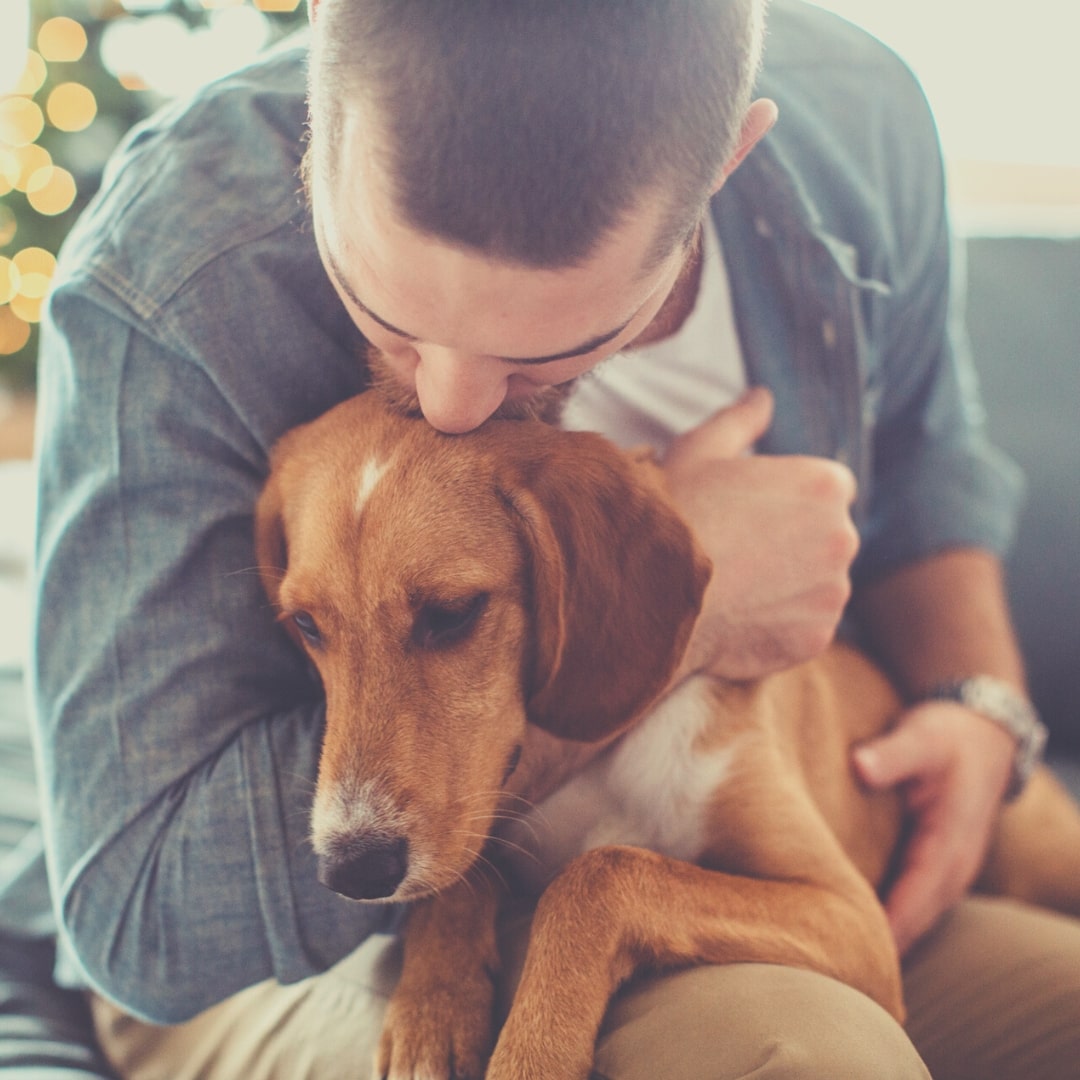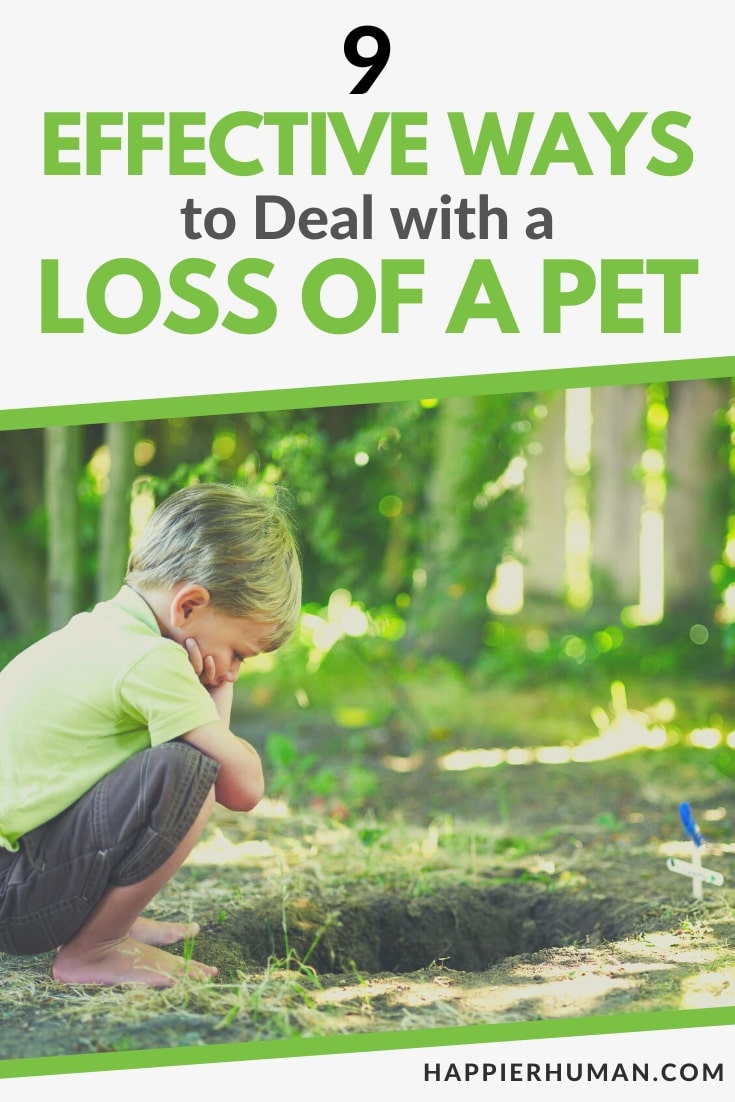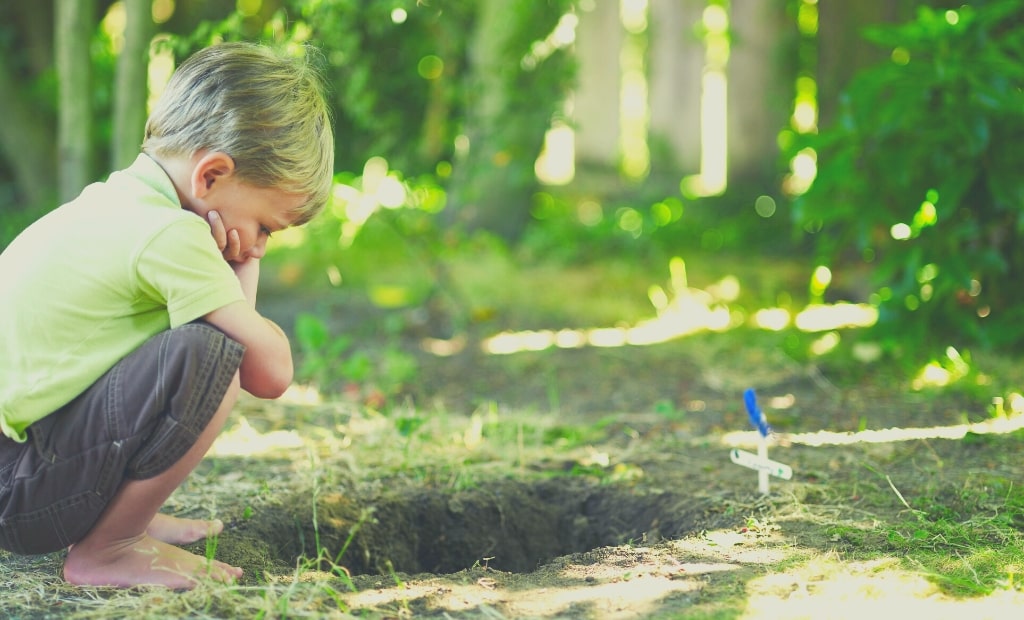If you are a pet mom or pet dad, you know how deep that bond with your fur baby stretches.
The love you have for your pet is so much more than just loving an “animal.” But, sadly, pets have a much shorter life expectancy than people do, and you will have to face their passing at some point.
Whether they pass in their sleep or you have to make the decision to end their suffering after disease or irreparable injury, the burden of loss is heavy. Knowing how to deal with the loss of a pet isn’t something you learn at school.
So how do you deal with this unspeakable loss that most of society doesn’t understand or support at all? When my beautiful German shepherd Seraph passed, I was at a loss for dealing with that pain.
But here’s what I discovered – may it help you during your own time of loss.
What Is Loss?
Loss is when something has been taken from you. When we lose something, whether it’s a person, pet, or favorite object, we grieve. Grieving is when our emotions have to come to terms with something we were attached to no longer being there.
As a society, we are not really equipped to handle the loss of a pet. When people die, we have rituals in place to help us grieve. Our friends and family understand what the loss of a person is, and they respect that the grieving takes time.
Sadly, in most cases, people don’t understand the loss of a pet and how it impacts you. In some ways, the loss of a beloved pet can be more traumatic than the loss of a person.
Types of Loss
In life, we have several types of loss we may face. There’s the loss of a person through death, divorce, separation, when they move away, if they end their friendship with you, or if they change and you have to end your friendship with them.
We lose partners, parents, children, friends, and colleagues. Extended family members may pass, and we lose community members who we knew only by reputation. That loss can be due to violence, old age, illness, accidents, or self-inflicted end of life.
Our pets can include any number of species, from dogs and cats to birds, fish, reptiles, horses, bunnies, alpacas, and more.
There’s no limit on the species, how long we’ve had them, or whether they passed naturally, through accident, or because we had to have them put to sleep (euthanized).
Why the Loss of a Pet Is Traumatic
When your husband passes, people are unlikely to suggest “getting another one” as soon as they hear, but when your pet passes, they often say exactly this. I’ve often heard people say “Get another puppy; it will help you get over the loss of your dog.”
To say that such comments are insensitive is an understatement.
If your human child passes, people will accept your grief for years. They’ll acknowledge your trauma and respect your sorrow resurfacing for years to come.
When your pet passes, you are expected to get over the death quickly, move on, and not speak of it again.
Should you have a bout of grief resurface after their passing, you’re likely to be chastised and told to “get over it.”
The denial of this grief invalidates your feelings and makes the loss all the more traumatic because you (often) have no support during your grieving process.
Pet loss grief has even become the topic of a hit blockbuster movie franchise – John Wick – and nobody would risk telling Mr. Wick to “get over” his dog’s loss. So why should you have to be told to be real and “get over it” because it’s just an “animal?”
The Need to Do Something to Mourn Your Pet
Most cultures have some funerary ceremonies or customs to help them grieve when a person passes. It’s important to mark the passing from life to death, acknowledge your pain, and start the process of healing from the loss.
We don’t always have the knowledge or access to rituals or customs for when we lose a pet. Grieving rarely starts, and you feel even more alone after the passing of your beloved pet.

While we keep more pets in our home environment today than in previous years, the acknowledgement of grieving (beyond using a pet cemetery) has still not progressed enough to sufficiently help us grieve.
In previous centuries, the wealthy in Egypt were buried with their pets, wives, slaves, and wealth. Statues were erected to famous or beloved pets in various cultures, and feast days were held to commemorate memorable pets.
Today, the second Tuesday in June is World Pet Memorial Day, and on October 27, you can celebrate the Day of the Dead (Dia de Muertos) for your pet (even though Day of the Dead or All Souls Day is celebrated on November 1-2).
On these days, mourning your pet loss is more socially accepted, and there are some rituals, like leaving your pet’s favorite food, or visiting their grave to help you remember your beloved pet.
But what about as soon as your pet passes? What do you do to start the grieving process and help you move forward?
I recall my first pet funeral – it was my budgie that passed – and my folks helped me make a small coffin, fill it with flowers, and place it in a shallow grave in the backyard.
We recalled a few beautiful memories about my pet bird, and I kept a feather in my diary. For me, at 7 years old, it was enough and grieving quickly resolved.
What do you do as an adult for a pet who has shared your life for decades or more? Let’s discover some ways of coping with pet loss.
9 Ways How to Deal with the Loss of a Pet
Knowing how to deal with pet loss is not something we’re always taught or supported with by the people in our lives.
Ignoring the pain and grief over the loss of your pet is not the right way to move forward. It’s important to treat the loss as real and potent as the loss of any best friend would be.
Here are a few suggestions to help you cope and begin the healing journey.
1. Accept That Grief Is Real and Set Time Aside
Your grief is real. Whether the loss of your pet was anticipated (such as with old age) or accidental, you should set aside some time after the loss to create some quiet space for grieving.
Don’t try to launch into life as if nothing happened when your pet has just died. Prepare yourself that everything around you and in your life will remind you of your beloved pet.
The space where they slept, their collar, winter jacket, and bed will all still be at home, ready to remind you of the loss.
It’s never a good idea to deny loss, so don’t try to hide the fact that your pet ever existed by throwing their things away or sticking it into a drawer. Instead, gather up their belongings, place it in an area of honor, just as you would for a person who passed.
Clear your schedule of any non-essential activities and events for a few days. If you can, try to spend time at home, giving your body time to decompress. The loss of a pet or person is always sudden and it triggers a trauma response in the body, which messes with brain chemistry.
If you have caring people in your life who understand what you are going through, you can surround yourself with them, but the most important thing is to rest after the loss.
Only once you have begun to rest more can you really process what has happened and how you will continue after the loss and face the absence of your beloved pet.
Resource:
Try using a sleep or meditation app to help you calm down and return your body and mind to a more tranquil state before you start the actual grieving process. Calm is a great meditation or sleep app, and the soothing sounds will help you decompress.
2. Identify Your Grief Caregivers
In ancient times, those who lost someone close to them were not left to grieve alone. They were usually supported by family members or close friends who kept watch with them, guiding them, and supporting them through rough patches.
Create a list of your most caring friends who understand that the pain of losing your pet isn’t just something you can brush off. These should be compassionate people who will stand by you and sit with you when your heavy heart is ready to break.
If your grief hits a low point, you should be comfortable phoning them or sending a message to let them know you need their help and care.
Don’t try to face debilitating grief alone – it’s not healthy.
You should be able to reminisce with friends and recall your fond experiences with your pet. Your friends and family can help you grieve by not denying that your pet even existed. Instead, make time to celebrate your pet with those who love you and care for you.
If you are truly alone, you can consider using a grief management app to help you take small steps each day when you have to bear grief alone.
Resource:
Grief Works is a self-help and care app that lets you take control of your grief, helping you slowly move toward healing.
3. Create a Memory Token for Your Pet
Horse owners have long held the tradition to cut some of their horse’s tail hairs when they pass to keep as a memory of their beloved pet. Owners would braid bracelets or make hair angels to remember their steeds by.
You can do something similar for your other pets too. Even a paw print with a photo of them will create a lovely area to really commemorate your pet.

There are several cremation services that work with vets across the US who can help you with the processing of your pet’s remains, collecting paw prints or a lock of fur to use later in a memory token.
You can also commission a local artist to create a beautiful keepsake with your pet’s ashes (and other keepsakes) that you can proudly place in your home, so your pet is always with you.
Resource:
Consider the Etsy Marketplace to look for pet remains painters to help your grieving process.
4. Celebrate Their Memory With Life
Your pet may have lost their life to a disease or trauma that could have been prevented. Their passing may galvanize you to turn your grief into energy to fight for awareness of their death, ensuring it never happens to another pet again.
If your pet had arthritis or some genetic disorder, you can also help educate the general public about the dangers of “backyard” breeders and interbreeding. Perhaps you can start a fundraising campaign to collect money for research into the disease that your pet lost their life to.
Likewise, you can also donate the money raised to local animal and pet charities and organizations that do amazing work in caring for other pets.
The most important part of this is to put your energy, pain, and frustration over your pet’s passing into a worthy cause that can help something positive come from the tragedy.
Resource:
Fundraising is easier than ever with resources such as GoFundMe.
5. Let Their Remains Go
If you are fortunate enough to have a pet cemetery nearby or live on a large rural property where the law allows for the burial of animal remains, you may already have made preparations for your pet’s remains after their passing.
However, if you choose to have your pet cremated, you may be stuck with their ashes on your dresser at home, and this can become a painful reminder of their loss.
It’s time to let their remains go. Choose a meaningful way of letting go. Perhaps you can bury their ashes with a fruit tree planted atop it, or you can use their ashes in a memory token (as above). You may even decide to hold a wake or scatter their ashes in a place that was special to you.
Remember, you are only letting their physical remains go, their memories will always be with you. This is also an ideal opportunity to make a ritual of the release.
Horse owners and the K9 units of law enforcement often have a ritual of having their colleagues or other owners stand by when their pet has to be put to sleep. Whether burying their body or ashes, you can make it special, which will also help you process their loss.
Line their grave with flowers, their favorite blanket, and release them by taking off their collar or headstall (for horses).
Resource:
Your local Parks services may have a list of pet cemeteries near you. However, before you decide to scatter your pet’s ashes in a local lake or on a hiking trail, you should consult the police or Parks services about the legal aspect of doing so.
In some states, it’s illegal to scatter remains (human or animal) without obtaining a letter of permission from the relevant authorities.
6. Talk About Your Loss
The loss of a pet can be even more traumatic than the loss of a human. For one, your pet saw you in ways that no human in your life ever did or will. They loved you unconditionally, which is why you are feeling stuck in limbo now they have passed.
With loss, grief, and grieving, you would be recommended to seek counseling or therapy (in the case of a human), so why not with the passing of your pet?
Find a local support group. Usually these are run by animal shelters, and sign up for some group therapy sessions.
It may help to find support from fellow pet owners who have also experienced the loss you feel. They could also support you with more ideas on how to grieve and move on.
These groups may also have art activities to help you express the pain you feel. Learning to paint or draw can help you come to terms with the great absence your pet has left.
It helps to not feel judged by people who don’t understand. These talk groups can really help you feel less “ridiculous” about losing your pet and grieving.
Resource:
Charity organizations like PAWS can help direct you toward counseling in your area to assist you during your time of grief.
7. Keep a Journal
A pet journal can help during the grieving process. As time moves on, you may begin fearing you will forget your beloved pet, and this can fill you with feelings of intense guilt and shame.
Remember your pet, share your memories of them, and record your feelings about them in a journal. This is an ideal place to keep photos of your beloved pet.
Keeping a journal gives you a place where you can write freely about your feelings and struggles about your pet’s passing.
You may be surprised by the raw feelings that the journal can reveal, and it’s also a safe space to let those emotions go without having to explain to others.
Your pet journal can help you plan for days when it’s super hard, such as your birthday, your pet’s adoption day, or their birthday, so you can prepare for those incredibly painful moments.
You can also record days when you feel more in control of your grief, how it makes you feel, and what your plans are to move forward.
Using a journal of grief is also an important step in self-care and the process of letting go.
Resource:
You can use any book to create a pet journal, or you can purchase one that contains specific prompts all about your pet. The choice of your pet journal format is entirely yours.
8. Say Goodbye With a Letter
A final way to say goodbye is to write a letter, poem, or song to your pet, letting them know you will never forget them.
The process of writing a farewell letter is cathartic, helping emotions to resolve while not betraying the bond you held with them. Your goodbye has been playing like a song in your head, and it’s time to put pen to paper.

The letter’s format can be anything that you believe is suitable for your relationship with your pet. Many pet owners have lengthy conversations with their pets when they are alive, so why not have a long chat with your pet now they have passed.
If you are stuck, here is an example of a pet grief letter that you may use to help you articulate your loss and move forward.
Sample Letter
My beloved (Name),
I can’t believe it’s been so long since you passed to the other side – it feels like just yesterday that your head was in my hand or rested on my knee. But with time, the pain still lingers and I wish you were next to me again.
There are no words to say how much I miss you each and every day.
We were together for such a long time, and your passing has left a massive void in my life and in my heart. Life feels empty without you.
I cherish all the wonderful memories: our walks at the park, hiking trails with you, and cuddling on the sofa together. People used to complain about your hair on my clothes and furniture, but I would give anything to have your hair in my life again.
Even though I know you are in a better place, I can’t help missing you. Please know I did my best for you, and I love you still.
Hopefully, we’ll see each other again in the Playground in the Sky. Until then, I will share my love with you and the other dogs too.
Wishing you love and friendship always,
(Name)
9. Getting Another Pet
The idea of getting another pet after just losing your beloved heart’s companion may be absolutely intolerable, and because so many people suggest it, you probably feel it’s insensitive. After all, you can’t replace what you lost.
However, there is a lot to be said for getting another pet after losing your pet. For starters, the love they give you can help soothe and comfort you.
Having another pet to care for can help you place your energy into something worthwhile, find reasons to live, and offer love to another living being.
You were probably an amazing pet owner, and your pet enjoyed so much love and joy in your care, so why stop that love now your pet has passed?
They would want you to share that same love with another pet, not to replace them, but to simply make another pet’s life worth living.
Resource:
Adoption agencies in the US offer many different pets up for adoption, and don’t just consider the puppies and kittens. Aged pets have so much love to give, so why not share your grief with them and offer them your love?
Final Thoughts on How to Deal with the Loss of a Pet
There is no wrong or right way for how to deal with the loss of a pet. Nobody has the right to tell you it’s time to move on or get over it. You are the one who lives with the grief of losing your partner and best friend.
However, there are ways to cope, ways to heal, and methods to overcome complicated grief.
Learn more about processing grief with our list of 77 grief affirmations.
And if you're looking for more articles about dealing with loss, check out these blog posts:
- Do Pets Bring Happiness? A Simple Answer
- 53 Words of Sympathy for the Loss of a Mother
- 21 Best Movies About Dealing with Grief and Loss
- 55 Comforting Death Quotes to Help Through a Loss
- 47 Uplifting Grief Quotes for Dealing with Loss & Pain
- 31 Things to Say When Someone Says Sorry for Your Loss


